
…in a series which commenced here.
For ages the Basic Channel / Rhythm & Sound guys have been reissuing the Wackies back catalogue as well as creating their own Basic Replay label for other obscure gems. They should be applauded for this, I think – it’s refreshing to see people rereleasing great stuff with proper attention to detail in these “last days of vinyl”.
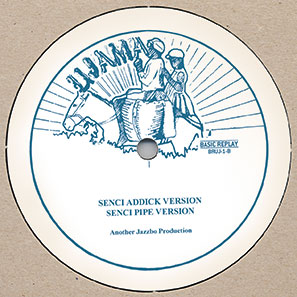
Their latest release is a 4 tracker of dubs of Prince Jazzbo’s digital productions. Which are great – he is very underrated as a digital producer compared to Tubby and Jammy. Indeed tracks like Horace Fergusson’s “Sensi Addick” are overlooked minimal scorchers every bit as good as the acknowledged classics.
It just seems a bit weird to me to release the dubs without the vocals. I’ve always been wary of techno fans who claim they like ragga but don’t like the vocals – it just seems like they are skimming the surface at best, or perhaps silencing black voices at worst.
At the Hardwax online store there are pages and pages of “Dancehall Rhythms” where the vocalist isn’t even mentioned (the “reggae” section appearing much further down their sidebar). So this latest release isn’t exactly out of the blue, but it is something I find a bit frustrating and not just because I’m a purist who wants to buy a pristine repress with the vocals intact.
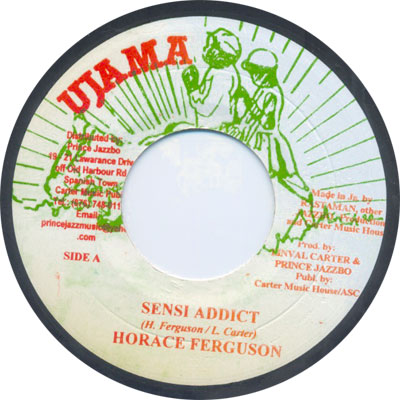
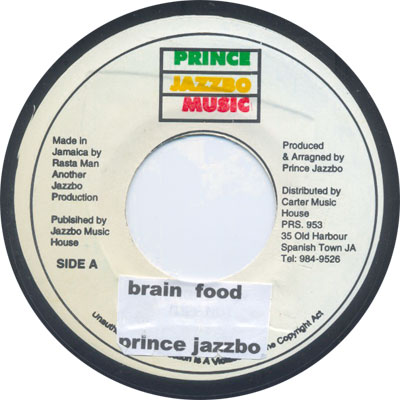
There are maybe some parallels here with the early UK Dub scene – producers who had been influenced by Jah Shaka sessions made primarily instrumental music at first – mainly because they didn’t know any vocalists and were white guys who didn’t feel able to sing on their own tunes – for all the right reasons. But as time went on various connections were made and vocals were cut.
In this case we’ve already had a slew of vocal productions on the Burial Mix label which were to my mind a pinnacle of reworking the dub template. So this seems like a bit of a retrograde step. I’m probably reading too much into it all, and on the upside the release might generate some further interest in Jazzbo’s productions which lead to some further reissues.
On the downside this might lead to even more irksome appropriation of reggae by the faceless techno/dubstep milieu… time will tell.
“On 13 August 1977, the far-right National Front attempted to march from New Cross to Lewisham in South East London. Local people and anti-racists from all over London and beyond mobilised to oppose them, and the NF were humiliated as their march was disrupted and banners seized.
To mark the 30th anniversary of the ‘Battle of Lewisham’ we are holding a half day event in New Cross on Saturday 10th November with speakers and films (1 pm start at Goldsmiths College, New Cross).”
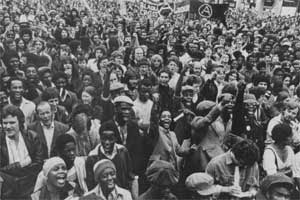
Some time has passed since the event at Goldsmiths, so my memory may play tricks on me. That would be in keeping with the write up on the Lewisham 77 blog makes the point that history is itself a battlefield, with various agendas and versions struggling to be heard. For me that was one of the most interesting aspects of the day – better than amassing a tick list of “facts” about what happened.
I arrived in time to see my friend Neil giving an overview of the events which lead up to the big day, and then we were straight into the first panel discussion.
This section could loosely be described as “leftie hacks vs the people”. On the one hand speakers on the platform and contributors from the audience tried to outline the orthodox left’s history of the event. Parts of this were very interesting – for example the tactics which succeeded in Lewisham had been attempted during a similar march in Wood Green some months beforehand, but hadn’t quite worked. The catastrophic humiliation of the Front in Lewisham severely limited their ability to operate a “march and grow” strategy.
And of course it is very heart warming to see that peoples’ sincerely held beliefs have endured over the 30 years since the day. However these contributions were marred for me by an emphasis on the bureaucracy of organising – the committee structure, lots of meetings, etc. And grandstanding, which was gloriously personified by an audience member from one sect beginning his “question” by trying to undermine the credibility of one of the speakers: “when I saw the poster I had no idea who you are, but now I see you I think I can remember you from back then”.
It’s undeniable that, like ‘em or loathe ‘em, groups like the Socialist Workers Party (SWP) et al played a huge role in the day’s events (as did local church groups). But they are often completely fucking boring to listen to.
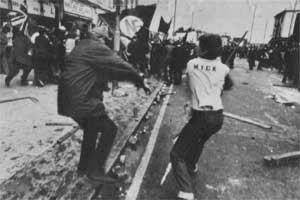
In stark contrast, the other speakers in this first section were much more lively. Martin Lux gave an account of rucking with the NF and the cops from a working class anarchist perspective which was as uncompromising as it was entertaining.
Dr William Lez Henry (aka Lez Lyrix) told us of his experiences growing up in the area and the racism he encountered on a daily basis. His talk was very instructive and went some way to break down the mythologising of the other contributors. For example he and his friends had been told by more senior members of the local black community to let the white anti-racists converging on the area from outside fight the white fascists doing the same. The role of black youth on the day was initially to defend the few black owned businesses in the area, but then of course events overtook them and many opportunities to confront the overt racism of the NF and the not-so covert racism of the cops were exploited to the full.
Lez’s comments are fleshed out in his new book Whiteness Made Simple: Stepping Into The Grey Zone (NuBeyond, 2007) , with a particular emphasis on the need for black autonomy and self-education as ways of combating institutional racism.
I can’t remember much about the q&a section. It was probably better than the questions later on, but that isn’t saying very much. At all.
The first panel session was followed by a series of films which varied in quality. One was positively avant-garde, combining a soundtrack of harsh traffic noise alongside some indistinct commentary by people being interviewed about their involvement in the great day.
The second panel discussion was chaired by Dr Henry (which I thought was a good sign, because he doesn’t put up with any nonsense!). It was more questioning in nature – which was very welcome.
There were a number of contributions throughout the day from people involved with current struggles, for example against the BNP in Barking, the No-Borders campaign, etc. I didn’t get the impression that there was anywhere near as much energy or creativity involved with these projects as in 1977, but then we live in different times.
It was, however, quite depressing to hear from a representative from Unite Against Fascism that their main tactic is to campaign for people to vote for anyone other than the British National Party. This seems to be singularly unsuccessful and perhaps the reason for this is that the BNP are positioning themselves as a radical alternative to all of the other parties – parties who many people feel have nothing to offer them. UAF’s position only serves to reinforce this divide. If people are pissed off with their New Labour council, there is little point in trying to get people to vote Labour just to keep the BNP out. If this tactic is the best the orthodox left have to offer then it is no wonder that the BNP are currently competing with the Greens to become the 4th major political party in the UK – or indeed the 2nd or 3rd in some areas.
On a more positive note, Paul Gilroy (yes, him!) gave a great talk on his experiences of the riot, which essentially were of abject fear. He used this as a tool to open up a discussion about mythologising the past and how attempts to produce one coherent story should be resisted.
One profound example of this is that the orthodox left remembers an old woman leaning out of a window on Clifton Rise and questioning some of those present on the counter demo. According to that story she then put her speakers out of her window and played Bob Marley’s “Get Up Stand Up” which electrified the crowd. Non-aligned people remember it as Junior Murvin’s “Police and Thieves” however.
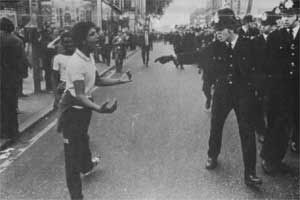
I find that very interesting for a whole number of reasons – not least that it reinforces Dr Henry’s comments that local black youth experienced far more oppression from the police than they did from swastika wielding NF members.
Gilroy was followed by Les Back whose contribution was similarly questioning and lacking in dogmatic certainties. He raised a number of issues around the changing face of British fascism. His questioning of the validity of the usefulness of referring to the BNP in the 21st Century as “Nazis” caused quite a stir amongst those involved in doing just that as part of the SWP-backed Anti-Nazi League, but to my mind he is bang on. His analysis extended into an interrogation of the idea of an English/British identity and how this is used by the right wing press as well as organised fascist groups, and of course by mainstream politicians.
I wanted this part of the day to be much more developed – how do you counteract the promotion of a “white identity” or a “national identity”? Do you:
a) take the piss out of it (by having a pop at middle-Englanders and morris dancing?).
But does this alienate people who have already bought into it to a greater or lesser degree? And do you replace it with anything else? – which brings us to:
b) Try to develop a more inclusive “English” identity – a la “curry and chips”, “reclaiming the Union Jack/Cross of St George”
– beaming faces looking up at you from the clip art produced by your press dept after having gone on their diversity training? Can you do this without appearing tokenistic (all these companies with black people splashed across their brochures, when their board of directors is all white guys in their fifties?). But isn’t an “inclusive” Englishness still basically an excuse for excluding people who are not “English” – i.e. the most recent waves of immigrants, but not those who have been here a while now?
c) Try to replace it with an identity based on class rather than race/nation…
Unfortunately that didn’t happen. What did happen was a series of mind-numbingly awful contributions from the floor, which consisted of the most heinous grandstanding I have ever had the misfortune to witness. Anyone who starts their “question” with “Right, I’ve just come from a meeting where we’ve been …” should be made to leave. The meeting degenerated into a thinly veiled competition to see who could justify their current political activity the best. Presumably this was meant to inspire people to join in or something. But as the “questions” got longer and longer my thoughts and energy began to evaporate. The British Left at play, fucking it all up as usual.
I fled the building with Martin after congratulating the organisers (because overall, I’d had a great time and it was very well organised), introducing myself to Dave Katz and saying hello to Lez.
The day raised so many questions it’s difficult to know where to begin. I learnt a lot about Lewisham 77 and realised how far we are away from anything like a successful mass movement against fascism 30 years later.
Further information is available at the great Lewisham 77 blog.

On the latest three mixes of this crucial series.
Of particular interest is the latest, from Dave Stelfox. Entitled One Drop And You Don’t Stop, it’s an essential rundown of proper JA roots material from recent years. All killer no filler, but if you’re like you’ll be less keen on the floaty acousticy guitar bits a la Drop Leaf, but be loving the harder bass driven consciousness on offer.
Check it out and subscribe if you haven’t already. Full details at Weareie, including a direct link to the mp3.
Nice overview at DanceCrasher
PRANCEHALL on Dominic, a white MC who rocked up in JA in the 80s and ended up recording tunes with Jammys and Penthouse, includng this one:
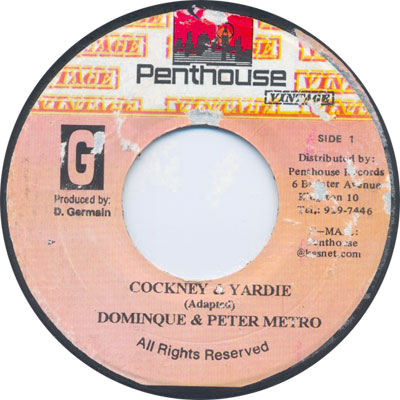
…which is blatantly a rip off of “Cockney Translation” by Smiley Culture, but is saved by dint of Dominic’s ridiculous sub-“Minder” stylings. And of course Peter Metro, who recorded “Police In England” as if to return the favour. Interesting to note that, after the success of UK MCs in Jamaica in the mid 80s, England and London got picked up as lyrical themes by JA deejays.
There’s an interesting interview with Dominic here where he talks about doing a book. Basically I’ve always considered him to be a total blagger who lucked out in the end, but I don’t mean that in a bad way – it makes the story much more interesting and of course all the best reggae deejays have at least as much front as they do musical skill.
It’s a timely rediscovery in the wake of the success of people like YT, Gentleman, Alborosie et al in recent years. Funny how white people in reggae is still worth column inches, but white people in grime is generally accepted.
Prancehall’s comments boxes are always a hoot, so check them too. I also really like the way he parodies nerdy bloggers by starting every post with a little note about how he’s linking to some other site but he actually discovered what they did ages before (but has been too busy or forgetful to write about it). At least I think it’s a parody.
Anyway, his Anger is a Gift mixtape is still one of my favourite things of 2007, so go and download it today if you haven’t already. It’s a totally solid lash up of dancehall and grime with some brilliant specials on there from people like Ce’Cile and Jammer.
lower end spasm.: Pan-generational dreadlocked legends to collaborate. Possibly.
I love all these little fleeting connections between grime and reggae. When Goodz or Trim just drop a line into their lyrics about their Dads doing stuff with soundsystems or whatever it just reinforces the links which are self evident. “Lyric Maker, from England not Jamaica” indeed…
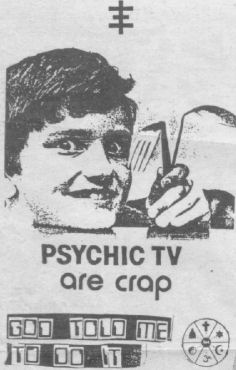
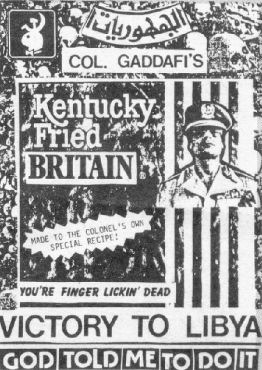
Stars of Vague Magazine now have a tribute page of press cuttings up on the web including the lowdown on squatting the Libyan Embassy and the “Enoch and Roll” tapes exposing some racist lyrics by The Beatles…
Oh yeah, just remembered that they also did this Mark Stewart pisstake which is linked from my article on his work.
DanceCrasher » The 100 greatest Rocksteady tunes
Man like Tim P giving us the lowdown of the sweet soulful sounds of rocksteady, with sound snippets for each entry in the chart! It’s not an era of JA music I know very much about, but I love the compilations I have.
Anyway, it’s all going to be great if songs like the Three Tops “It’s Raining” and Alton Ellis’ “Girl I’ve Got a Date” are in the 100-91 section…